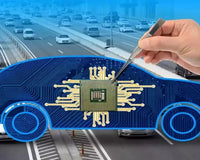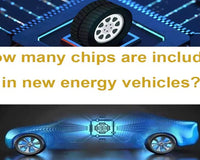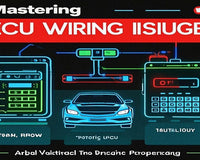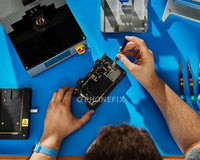What Are Semiconductor Chips?

Semiconductor chips, often referred to as integrated circuits or microchips, are the building blocks of modern technology. These small electronic devices consist of numerous tiny components such as transistors, resistors, and capacitors. Made primarily from silicon, these chips act as the brains of electronic devices, controlling various functions by processing and storing data.
Types of Semiconductor Chips
There are several types of semiconductor chips, each serving a unique purpose. Microprocessors IC are the most well-known type and are used in computers to execute instructions. Memory chips store data, while logic chips process it. Analog chips convert real-world signals into digital data, essential for many car applications.

On average, a typical vehicle contains around 1,000 to 3,000 semiconductor chips, These chips are distributed across various systems within the car. The engine control unit (ECU) alone contains multiple chips that manage fuel injection, ignition timing, and emission controls. Infotainment systems, airbag controls, antilock braking systems, and power management also rely on semiconductor chips.
Engine Control and Performance
One of the most critical roles of semiconductor chips in cars is managing engine performance. Engine Power IC optimize fuel efficiency and reduce emissions. By constantly monitoring and adjusting engine parameters, semiconductor chips ensure that the engine runs smoothly and efficiently.

Safety and Driver Assistance
Semiconductor chips are at the heart of various safety and driver assistance features. Airbag deployment systems use these chips to detect collisions and trigger airbags instantly. Advanced driver assistance systems, such as automatic emergency braking and blind-spot detection, also rely on semiconductor chips to process data from sensors and make split-second decisions.
Start-Stop Technology
Start-stop technology, which automatically shuts off the engine when the car is idle and restarts it when the driver accelerates, relies on Idling Throttle IC chips. These chips monitor various parameters and ensure a seamless transition between engine off and on states,

Infotainment and Connectivity
Modern cars are equipped with sophisticated infotainment systems that offer navigation, entertainment, and connectivity features. Semiconductor chips enable these systems to function seamlessly. From touchscreen displays to voice recognition, these chips enhance the overall driving experience by providing convenience and entertainment.
The global semiconductor shortage has highlighted just how dependent the automotive industry is on these tiny components. From engine control to infotainment systems, these tiny components play a crucial role in enhancing safety, efficiency, and overall driving experience. This shortage underscores the critical role that semiconductor chips play in modern automotive manufacturing.










